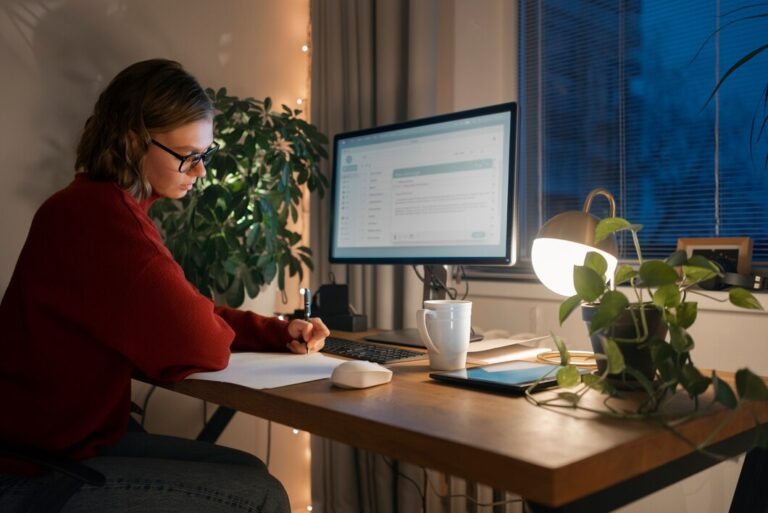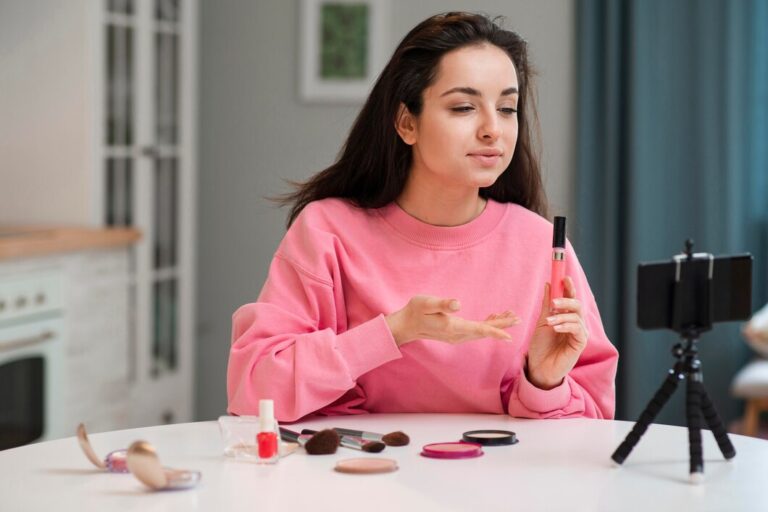
Does your brain feel like it has too many tabs open? Are you caught in a relentless cycle of scrolling, swiping, and refreshing, only to feel more drained and disconnected than ever? You’re holding a supercomputer in your pocket, yet your primary feeling is often one of exhaustion, anxiety, or a vague sense of unease. This guide is built on a powerful premise: unplugging from technology boosts mental health, and we’ll show you exactly how with practical digital detox tips.
This feeling of being constantly “on,” tethered to a digital world that never sleeps, is the defining struggle of our time. But what if the solution wasn’t a new app or a productivity hack, but simply… unplugging?
This is not another article that will simply tell you to use your phone less. We will dive deep into the compelling science of how constant connectivity reshapes your brain, explore the transformative benefits of a deliberate digital detox, and provide you with a concrete, actionable framework to reclaim your mental clarity. Prepare to move from a state of frazzled reactivity to one of intentional peace.

The Digital Brain: How Constant Connectivity Hijacks Your Mental State
To truly appreciate the power of unplugging, you first need to understand what relentless connectivity is doing to your brain. Our minds evolved over millennia in an environment where information was scarce and valuable. Today, we live in an information tsunami, and our brains are struggling to cope. This neurological overload is at the very heart of why so many of us feel anxious and overwhelmed.
Think of your brain’s attention system as a muscle. Every notification, email, and breaking news alert is a small weight you force it to lift. A study referenced by the American Psychological Association found that the average office worker checks their email up to 74 times a day, while the average person checks their phone 150 times.
This constant task-switching doesn’t make you a better multitasker; it fragments your attention and fatigues your prefrontal cortex, the part of your brain responsible for deep thinking, focus, and emotional regulation.
This state of “continuous partial attention” keeps you in a low-grade state of fight-or-flight, flooding your system with the stress hormone cortisol.
The metaphor of a “dopamine slot machine” is often used for a reason. Social media and apps are designed by behavioral psychologists to provide intermittent, variable rewards—a ‘like’, a comment, a new piece of content.
This releases a hit of dopamine, the feel-good neurotransmitter, creating a powerful compulsion loop.
A 2024 report from King’s College London highlighted that these design patterns are directly linked to addictive behaviors, particularly in adolescents.
The result? Your brain’s reward system is rewired to crave constant, shallow stimulation, making it incredibly difficult to find satisfaction in slower, more meaningful real-world activities.
Why Unplugging from Technology Boosts Mental Health in Unexpected Ways
When you intentionally disconnect, you’re not just taking a break; you’re creating a powerful therapeutic environment for your mind to heal and recalibrate. The benefits go far beyond simply feeling less stressed. A digital detox allows for profound shifts in your cognitive function, emotional well-being, and your very perception of the world around you.

Reawakening Your Creativity Through Boredom
In our hyper-stimulated world, boredom has become an endangered species. We fill every spare moment—waiting for coffee, standing in a lift, sitting on a bench—with a quick scroll.
But neuroscientists now understand that boredom is the fertile ground where creativity is born. When your brain isn’t passively consuming information, it enters what’s called the “default mode network.” This is the brain state associated with mind-wandering, daydreaming, and making novel connections between disparate ideas.
- Tweetable Quote: “Boredom is not a void to be filled, but a space to be explored. It’s where your best ideas are waiting for you.”
- The Science: A study published in Consciousness and Cognition found that participants who were allowed to experience a period of “restful, quiet boredom” significantly outperformed their constantly-stimulated counterparts on subsequent creative tasks. Unplugging gives your brain the quiet space it needs to have its “aha!” moments.
Reclaiming the Depth of Your Relationships
Technology promises connection, but often delivers a counterfeit version. We trade deep, empathetic engagement for a stream of shallow updates. Have you ever been “phubbed” (phone snubbed) by a friend or partner? It stings because it sends a clear message: the digital world in their hand is more important than the real person in front of them.
Unplugging forces you to re-engage with the fundamental building blocks of human connection.
- Enhanced Empathy: Face-to-face conversation is a rich symphony of micro-expressions, body language, and vocal tone. Screen-based communication strips much of this away, weakening our empathetic muscles. Disconnecting allows you to re-sharpen these skills.
- Deeper Presence: When you’re fully present with someone, without the looming distraction of a notification, you listen more intently and share more authentically. This fosters a level of intimacy and trust that a text message simply cannot replicate. A case study from the University of Arizona found that couples who instituted “device-free” dinners reported higher levels of marital satisfaction and connection.
The Ripple Effect: Better Sleep, Reduced Anxiety, and a Calmer Mind
The positive impacts of a digital detox create a powerful upward spiral for your overall well-being. Two of the most immediate and profound changes you’ll notice are in your sleep quality and your baseline level of anxiety. These two factors are deeply intertwined and are often the first casualties of a hyper-connected lifestyle.
The link between screen time and poor sleep is undeniable. The blue light emitted by our phones, tablets, and laptops is a major saboteur of our natural sleep cycles. This specific wavelength of light suppresses the production of melatonin, the crucial hormone that tells your body it’s time to wind down and sleep.
When you scroll in bed, you’re essentially sending a signal to your brain that says, “It’s still daytime! Stay alert!” A 2025 report from the Sleep Foundation found that 71% of adults who keep their phones in their bedroom report experiencing sleep disturbances.
By implementing a simple digital detox rule—like no screens for at least one hour before bed—you allow your melatonin levels to rise naturally, leading to faster sleep onset and more restorative, deep sleep.
This improvement in sleep has a direct and immediate effect on your anxiety levels. When you’re sleep-deprived, your amygdala—the brain’s emotional and fear center—becomes hyperactive, while your prefrontal cortex becomes less active. This is a neurological recipe for anxiety and emotional volatility.
Furthermore, unplugging removes the constant influx of anxiety-inducing stimuli, from stressful work emails to distressing news cycles and the endless social comparison on Instagram.
You are no longer marinating your mind in a soup of curated perfection and global crises. This gives your nervous system a chance to reset from a state of chronic hyper-arousal to one of calm, dramatically lowering feelings of anxiety and overwhelm.
Your Actionable Guide: Practical Digital Detox Tips for Real Life
The idea of a digital detox can feel extreme, but it doesn’t have to be an all-or-nothing proposition. The goal is to move from mindless, compulsive use to mindful, intentional engagement. Here is a practical, tiered approach to help you get started, no matter how tethered you feel.
Level 1: The Micro-Detox (The Beginner’s Step)
This level is about creating small moments of friction and mindfulness throughout your day.
- The First & Last Hour: Make the first hour of your morning and the last hour before bed completely screen-free. This prevents your day from starting and ending in a reactive state.
- Mealtime Moratorium: Declare all meals—whether alone or with others—as device-free zones. This helps you practice mindfulness, enjoy your food, and connect with people.
- Notification Neutering: Go into your settings and turn off all notifications except for phone calls and messages from your absolute essential contacts. Reclaim your attention by deciding when you want to check for updates.
Level 2: The Digital Diet (The Intermediate Challenge)
This involves setting clear boundaries and designated times for your tech use.
- App Time-Boxing: Use your phone’s built-in screen time features to set daily time limits for your most problematic apps (e.g., 30 minutes for Instagram, 20 minutes for news apps). When the time is up, it’s up.
- The Weekend Wind-Down: Choose one afternoon or evening of the weekend to go completely offline. Put your phone in a drawer and engage in an analog hobby: read a book, go for a hike, cook a complex meal, or play a board game.
- Curate Your Home Screen: Treat your phone’s home screen like prime real estate. Remove all social media, email, and browser apps from it. Keep only essential utility tools. Force yourself to swipe and search for the distracting apps; this simple act of friction can deter mindless opening.
Level 3: The Full Digital Sabbath (The Advanced Reset)
This is a full 24-48 hour break, typically over a weekend, designed for a deep mental reset.
- Plan Ahead: Let key contacts know you’ll be unreachable. Set up an “out of office” auto-reply.
- Prepare Your Environment: Gather everything you’ll need for your analog period: books, journals, music (on a non-phone device if possible), and ingredients for meals.
- Power Down Completely: Don’t just silence your phone. Turn it off and put it somewhere out of sight. The physical act of shutting it down is psychologically powerful. Embrace the initial discomfort—it’s a sign that the rewiring is beginning.
Conclusion: From Digital Overload to Intentional Living
The narrative of our modern lives is one of constant acceleration, fueled by technologies that demand more and more of our attention. The silent epidemic of our time isn’t just the sheer volume of information, but the erosion of our ability to think deeply, connect authentically, and simply be. We’ve explored the hard science behind why unplugging from technology boosts mental health, from rebalancing your brain chemistry to deepening your human connections.
The journey from digital dependency to digital wellness is not about rejecting technology, but about reclaiming your rightful place as its master. It’s about making a conscious choice to trade shallow distraction for deep engagement. It’s about understanding that your attention is your most precious currency, and you get to decide how to spend it.
The power to change is in your hands. Don’t wait for burnout to be your wake-up call. Start today.
Choose one digital detox tip from this guide—just one—and implement it for the next week. Notice how you feel. The path to a calmer mind and a more fulfilling life doesn’t require a radical overhaul, but a single, intentional step away from the screen and back toward yourself.
Frequently Asked Questions
How can I do a digital detox if my job requires me to be online?
This is a common and valid concern. The key is to create clear boundaries. An effective strategy is “time-blocking,” where you dedicate specific, uninterrupted blocks of time for focused work and then schedule short “offline” breaks.
Use features like “Focus Mode” on your devices to block non-work-related apps and notifications during work hours. The goal for professionals isn’t a total disconnect, but to stop the “bleed” of digital work life into personal time by setting firm “end of day” rituals where you log off completely.
What is the fastest way unplugging from technology boosts mental health?
The most immediate benefit people report is a reduction in anxiety.
This comes from two sources: 1) a decrease in the stress hormone cortisol from constant notifications, and 2) a break from the social comparison and negative news cycles that fuel anxiety.
Improving sleep quality by instituting a “no screens before bed” rule is another fast track to better mental health, as proper rest is foundational to emotional regulation.
Are there any negative side effects of a digital detox?
Initially, yes. It’s common to experience withdrawal symptoms like restlessness, irritability, and a strong sense of FOMO (Fear of Missing Out). This is your brain’s dopamine system craving the stimulation it’s used to.
The key is to anticipate this discomfort and have a plan of analog activities to push through it. These feelings typically subside within the first 24 hours and are replaced by a sense of calm and clarity.






